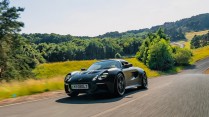Subaru Teams Up with Toyota to Develop Trio, Gaming-Changing Electric Crossovers
By Dabbie Davis
May 14, 2024 12:30 AM EDT

Having a history of collaboration in vehicle development, Subaru and Toyota are strengthening their partnership, with Subaru's executive confirming plans to jointly produce three new electric crossovers. This strategic alliance aims to mitigate the substantial risk inherent in independently venturing into EV production.
Subaru, Toyota Joint Venture for Electric Crossovers
Subaru and Toyota have joined forces to collaboratively create three electric crossovers set for launch by 2026. This alliance seeks to mitigate risks in the competitive electric vehicle (EV) sector, requiring substantial investments in advanced technology despite a current slowdown in the market.
According to Autoblog, Atsushi Osaki, the CEO of Subaru, announced on Monday that the two companies will work together to produce three new electric crossovers in the next two years. Osaki underlined the strategic benefit of working with Toyota on joint development to lower uncertainty and the high risk associated with solo endeavors in the EV industry.
The choice to draw on Toyota's experience shows how Subaru manages the significant financial and time demands of electric car innovation while retaining its devoted fan base, especially in light of Toyota's bigger scale and 20 percent shareholding in Subaru.
The Drive stated that the relationship between Subaru and Toyota is not a recent development, given their history together on a variety of cars, such as the Toyota GR86 and Subaru BRZ. Most notably, they work together to develop the Toyota bZ4X and Subaru Solterra, which are both electric vehicles made at Toyota's assembly plant in Motomachi, Japan.
However, it is anticipated that Toyota would assemble the next three electric Toyobarus in the US, making both brands' vehicles eligible for federal tax credits under the Inflation Reduction Act. Subaru currently has no plans for electric vehicle (EV) production in the U.S., according to Osaki.
Instead, the focus remains on hybrid models like the Crosstrek and Forester, set to receive new hybrid powertrains manufactured at Subaru's Indiana plant. This shift signifies a notable change for the Forester, traditionally produced in Japan, reflecting Subaru's strategic adaptation to the evolving market conditions.
As per Electrek, Subaru, under Osaki's leadership since April, is targeting a 50% share of electric vehicle (EV) sales, aiming for approximately 600,000 unit sales by 2030. This goal represents a substantial increase from the previous strategy, which targeted a combined 40% sales share for hybrids and EVs.
The new plans involve introducing four fully electric SUVs, including the Solterra, by the end of 2026, with an additional four EVs planned by the end of 2028, bringing the total to eight. In the U.S., Subaru aims to achieve 400,000 EV sales by 2028, marking a remarkable over 4,400% increase from the 8,872 Solterra models sold the previous year.
READ MORE: Next-Gen Jaguar EV Takes Center Stage as Ultimate Grand Tourer at $125,000
Subaru intends to manufacture one of the three new EVs at its Yajima plant in Japan to cater to both companies. Meanwhile, Toyota plans to produce Subaru's initial three-row electric SUV in Kentucky in 2025, following the launch of its larger SUV model.
Strategy to Survive in Challenging Market
According to CBT, the partnership will grow to include international markets in the upcoming years. Electric crossovers are expected to go on sale in 2026, and manufacture will probably take place in countries like the United States and Japan.
By utilizing Toyota's resources, Subaru hopes to expand its product line and seize possibilities in the rapidly evolving automotive market. Furthermore, this collaboration aligns with Subaru's wider electrification tactics, which encompass the integration of cutting-edge hybrid systems into cars like the Forester and Crosstrek. Subaru also intends to strengthen its production capacity by introducing hybrid and all-electric manufacturing at its American and Japanese sites.
The report from The Drive further stated that collaborating with Toyota enables Subaru to reduce research and development expenses, thus retaining a larger portion of its recent earnings. Subaru has seen a significant increase in operating profits, reaching $3.06 billion over the last year, while net income surged to $2.55 billion, marking the brand's most substantial growth since 2016.
Given the stable sales and impressive profits, Osaki aims to maintain this momentum without significant disruption, particularly concerning electric vehicles (EVs).
RELATED ARTICLE: Subaru Introduces Next-Gen BRZ Cup Car with Superior Features
Copyright @ MOTORTIMES, All rights reserved. Do not reproduce without permission.








